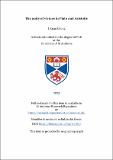Files in this item
The unity of virtues in Plato and Aristotle
Item metadata
| dc.contributor.advisor | Hampson, Margaret | |
| dc.contributor.advisor | Long, Alex | |
| dc.contributor.author | Chong, I Xuan | |
| dc.coverage.spatial | 240 | en_US |
| dc.date.accessioned | 2023-11-10T14:10:33Z | |
| dc.date.available | 2023-11-10T14:10:33Z | |
| dc.date.issued | 2023-11-29 | |
| dc.identifier.uri | https://hdl.handle.net/10023/28676 | |
| dc.description.abstract | “Unity of virtues” is the idea that virtues should be understood in holistic terms. Part I focuses on Plato’s Protagoras. It argues that, according to Plato’s Socrates, “unity of virtues” is true in the sense that all the apparently different virtues are in fact the same state of soul, namely the state of knowledge. Knowledge shapes how one perceives, deliberates, chooses, acts, and feels. Socrates’ ideal agent is transparent in the sense that what he knows of himself is the same as the truth about what ought to be the case. Further, the idea that “virtue is one” has important pedagogical significance: in reminding us that virtue cannot be compartmentalised, it demands us to stay vigilant: there is always an opportunity to be virtuous, just as there is always an opportunity to be vicious. Part II concentrates mainly on Aristotle’s Nicomachean Ethics VI and its relation to II-V. It argues that, according to Aristotle, “unity of virtues” is true because attaining practical truth implies the mutual entailment of the ethical virtues. The different ethical virtues can be seen as different ways to attain practical truth, and these different ways of attaining practical truth are themselves manifestations of our nature as practical rational beings. Aristotle’s ideal agent is transparent in an even deeper sense: the excellent condition of his soul reveals the truth about what it is to live well as a practical rational being. Further, in emphasising the importance of “choice”, Aristotle’s account captures how, contra Plato’s Socrates, the well-functioning of the practical intellect is hostage to the well-functioning of the non-rational soul. Aristotle’s theory is just intellectualised enough: the wise practical intellect has its proper role to play, but the ethical virtues are not thereby reduced to wisdom. | en_US |
| dc.language.iso | en | en_US |
| dc.subject | Unity of virtues | en_US |
| dc.subject | Socratic intellectualism | en_US |
| dc.subject | Plato's Ethics | en_US |
| dc.subject | Aristotle's Ethics | en_US |
| dc.subject | Protagoras | en_US |
| dc.subject | Nicomachean Ethics | en_US |
| dc.subject | Practical wisdom | en_US |
| dc.subject | Practical truth | en_US |
| dc.subject.lcc | BJ1531.C5 | |
| dc.subject.lcsh | Plato. Protagoras | en |
| dc.subject.lcsh | Aristotle. Nicomachean ethics | en |
| dc.subject.lcsh | Virtue | en |
| dc.subject.lcsh | Ethics | en |
| dc.title | The unity of virtues in Plato and Aristotle | en_US |
| dc.type | Thesis | en_US |
| dc.type.qualificationlevel | Doctoral | en_US |
| dc.type.qualificationname | PhD Doctor of Philosophy | en_US |
| dc.publisher.institution | The University of St Andrews | en_US |
| dc.identifier.doi | https://doi.org/10.17630/sta/657 |
This item appears in the following Collection(s)
Items in the St Andrews Research Repository are protected by copyright, with all rights reserved, unless otherwise indicated.

